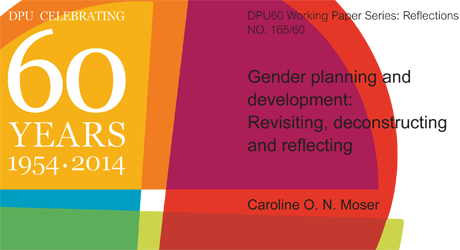DPU Working Paper - No. 165
Gender planning and development: Revisiting, deconstructing and reflecting

21 January 2014
The purpose of this Working Paper, written to celebrate the DPU’s 60th Anniversary, along with the 30th Anniversary of its gender programme, is to revisit gender planning during this period. It deconstructs different phases; from the ‘invention’ of gender planning in the 1980s, to its widespread ‘diffusion’ as the ‘Moser framework’ in the 1990s, followed by a marked ‘divergence’ between practitioners using the planning framework and feminist theorists critiquing it.
By the late 1990s, after the successful Beijing Platform for Action, the paper identifies a ‘convergence’ associated with the wide-scale adoption of gender mainstreaming by most institutions previously using the different gender analysis frameworks. Since then gender practitioners have focused on gender mainstreaming and empowerment, while for feminist academics the dominant paradigm has been ‘gender transformation’. In many respects, the limitations of gender mainstreaming in practice, has meant that gender planning, even if by another name, has come full circle contributing to a practitioner-focused gender framework that creates awareness for new generations, as well as providing associated methodological tools for policy, planning and project formulation and implementation.
At each phase, the paper identifies underlying tensions between the political and technical/instrumental; as well as the divorce between theory and practice, as it reflects on both short and long term impact of gender planning over the past 30 years, as feminists and practitioners have responded both to a changing global macro-economic context as well as further developing gender theory and practice.
Today there are new challenges; the divorce between theory and practice appears to be greater than ever, with result-based management and evidence-based policy and planning dominating development practice, counterpoised by ‘transformative social relations’ as the dominant theoretical academic gender discourse. This raises the intriguing question, where is gender planning?
 Close
Close

